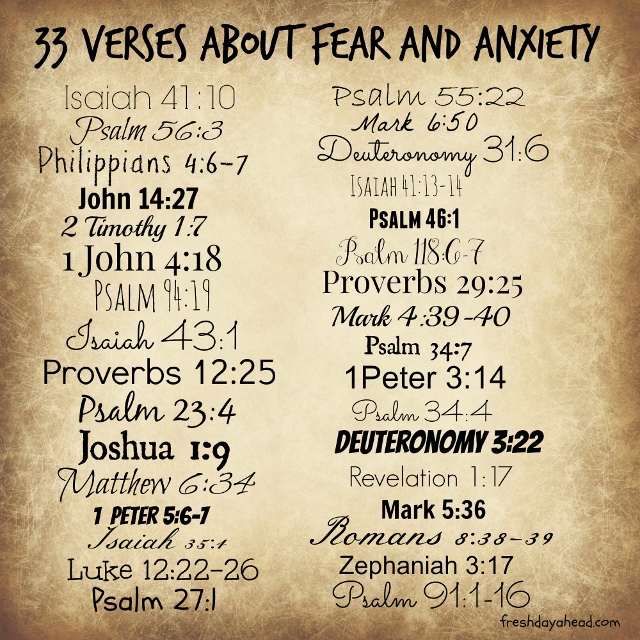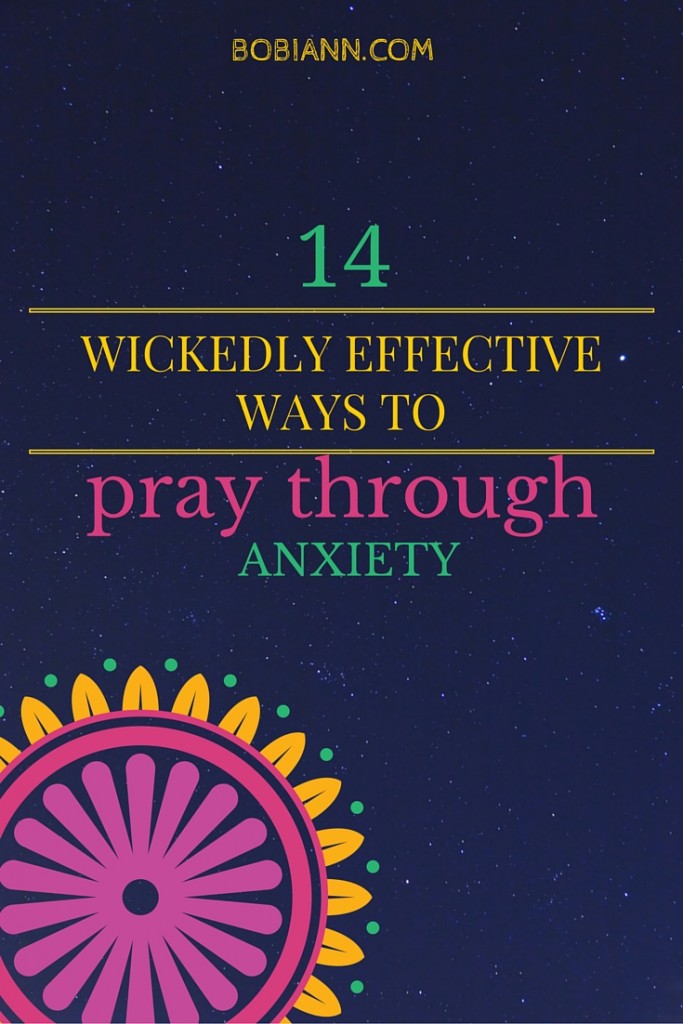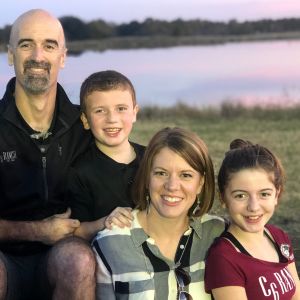 Anxiety. It’s that weird word that if you’ve ever really experienced it holds so much meaning it seems there should be more letters in it! It’s this combination of worry and fear and physical responses all wrapped into one.
Anxiety. It’s that weird word that if you’ve ever really experienced it holds so much meaning it seems there should be more letters in it! It’s this combination of worry and fear and physical responses all wrapped into one.
Before I go into this list, I need to say a few things. First of all, I was diagnosed with anxiety at the age of twenty. I have been medicated since that point.
Periodically, I’ve tried to come off my medication but have never adequately been able to function well without it. I tell you that to say, I live daily with anxiety. It is with medication that I’ve learned to cope. But it is because of the Peace-giver that I’ve found a life beyond survival. I’ve found rest in the One who can hold me in the midst of my anxiety.
[su_note note_color=”#4576d1″ text_color=”#ffffff” radius=”6″]Anxiety is real. I am not a doctor, psychologist or counselor. I am only a girl who has walked the road of anxiety and is sharing what I’ve found with someone who could benefit from what I’ve learned. Prayer is powerful and our God is mighty to heal, yet, there are times when He allows medical care to be part of His plan for healing. [/su_note]
In order to help you work through this list in a practical and interactive way, I’ve created a Praying Through Anxiety Printable Journal. I created this printable journal that walks you step-by-step through the techniques below exclusively for readers of this post. *Check it out here*
Here are 14 ways, I’ve found to effectively pray through my anxiety:
1. Label Your Feelings not Your Circumstances
For those who deal with anxiety (and even those who don’t), one of the most common situational responses is to find someone or something in which to credit our state of mind. The reality of your circumstances may be a contributing factor to your emotions but choosing to say “I feel angry”, “I feel depressed” or “I feel angry” is more effective than recounting the contributing circumstances around your emotions.
Acknowledging your feelings is a key component to releasing and breaking the hold of anxiety. So here’s how you do it:
-Evaluate what you are experiencing by listing particular circumstances and assigning your corresponding emotion to the situation.
-Use your emotional vocabulary to give a label to what you are feeling. An example of expanding and using your emotional vocabulary can be found here.
-Summarize, restate, or rephrase the core of what you are feeling and experiencing.
-Give your anxiety a name by assessing your mindset. Here are some questions you might find helpful–Quick Anxiety Screening Test Don’t feel the need to explain or understand your feelings at this point. Naming and becoming aware of your anxiety is vital if you are going to move forward and find a place of freedom. You can use this screening test in conjunction with the *Praying Through Anxiety Printable Journal* Don’t forget to get your copy.
2. Vulnerably Confess Your Weakness to God
Once you have put a name to your anxiety, it is tempting to think you can deal with your symptoms and maybe even the root of your anxiety on your own. Many of us tend toward an independent approach. We buckle down and convince ourselves if we work harder, we can solve our issues on our own. News Flash! Choosing to deal with anxiety on your own will only intensify your anxiety. You will likely feel more overwhelmed, more helpless and certainly more anxious. Paul wrote this in his second letter to the church of Corinth speaking of God,
But he said to me, “My grace is sufficient for you, for my power is made perfect in weakness.” Therefore I will boast all the more gladly about my weaknesses, so that Christ’s power may rest on me.–2 Corinthians 12:9
In order to vulnerably confess your weakness to God you have to first, admit to yourself and to God you are weak. You are Daring to Be Vulnerable With God. Inviting God Into your Messy Broken Life makes Taking Your Need To God almost natural and ultimately a gift to be enjoyed. Why Being Vulnerable is a Beautiful Thing
3. Relish in WHO God is
One of the scariest parts of vulnerability with anyone is trusting that person with our weakness. Many of us have had experiences when we regretted being vulnerable. We were left hurt, taken advantage of and scarred.
Choosing to be vulnerable with anyone should be done within a context of trust and knowing the person we are committing our weakness to. If you don’t know and trust the character of God, it will be hard (read ‘next to impossible’) to confess your anxiety.
In order to understand and experience the true character of God spend some time getting to know who He really is.
-Take some time to make a list of who you already know and (really believe) God to be. Don’t include an attribute or character of God that you aren’t certain of–this is for your benefit not a test you have to pass!
-Make a second list of who you need God to be for you RIGHT NOW as your walk through anxiety.
-Explore who the Bible says God is.–Attributes of God
-Evaluate and analyze what characteristics of God make Him capable to handle and understand your anxiety.
This step, and all the others are actually covered in the *Praying Through Anxiety Journal*
4. Distinguish genuine problems from fabricated problems
For those who suffer with anxiety, the tendency to be fret over fabricated problems is just as (if not more so) likely than fretting over genuine issues. After recognizing you are, in fact, dealing with feelings of anxiety, allow God to help you discern if your anxiety is valid. Are you anxious about something real or something invented in your mind?
-Identify the source of your anxiety. Is it due to a particular conversation, a daunting list of responsibilities, the future?
-Recognize what aspects of the source are factual and can be proven.
-Become familiar with common lies you tend to believe. Here is a list of lies women frequently believe: 40 Lies Women Believe
5. Reject Lies
When dealing with our emotions, it is hard to remember our feelings are untrustworthy. What we feel seems to be reality even when it is irrational and at times unreliable. Choosing to reject the deception of our emotions requires considering some really hard truths. Once you have determined your anxiety is rooted in falsehood, make an intentional choice to reject the lies by:
-Recognize that the heart is deceitful.
“The human heart is the most deceitful of all things, and desperately wicked.”–Jeremiah 17:9
In the original language the word “heart” is referring to “inner man, mind, will” in other words it’s dealing with the root of your feelings. Most educated individuals are taught to trust our logic and mind but in reality, the mind/heart can easily deceive.
-Yield your feelings to God–emotions have the capacity to be instruments of God to help direct our lives, but only when they are fully surrendered to Him.
-Replace Lies with Truth (see #7)
6.Tackle the Real Problem the Right Way
“Do not be anxious about anything, but in every situation, by prayer and petition, with thanksgiving, present your requests to God.”–Philippians 4:6
It is true that some of our problems are more imagined than real but there are some problems that are more real than we even understand. Yet, what we do understand is hard and painful and scary. The reality is the obstacles of life (future, friendships, finances or medical conditions) lead to feelings of anxiety. So, what do we do?
Scripture says, “pray.” When you are anxious, the right response is prayer–prayer in partnership with thanksgiving.
Because anxiety is an ongoing struggle for me, I make thanksgiving a daily part of my prayer time.
Consider tackling your REAL problem by:
-Calling it out to God–are you anxious about a relationship? Tell God the details. Concerned about your job or a diagnosis? Relay the specifics to God.
-After giving account of the cause of your anxiety to God, ask Him for precisely for what you want. Do you want healing? Ask Him. Do you desire peace in your home? Plead with Him.
-Give thanks. It may seem a dramatic shift in conversation but trust me, you need it. Make a list of what you can truly think God for. It may be specific to your “real” problem or it maybe something more intangible like a cool breeze on a hot day. I purposely write down five things every day, I am grateful for and I make an intentional effort to NOT name the same five every day.
-When you’ve acknowledged that God has provided you much to be grateful for, it will be easier and appropriate to yield your will to His. Your desires may not change but recognizing God’s plan is good and beneficial will provide peace and comfort.
7. Remember What You Know
As mentioned in number five, we can only successfully reject lies if we are replacing them with truth. Do you know what you know regarding God?
Quite simply, the best way I’ve seen this put is in an article by my friend, Leighann McCoy called
[su_button url=”http://www.leighannmccoy.com/god-is-silent-on-many-things-but-these-6-things-i-know/” background=”#741342″ color=”#ffffff” size=”6″ wide=”yes”]God is Silent on Many Things But These 6 Things I Know![/su_button]
I could give you a list but (in my opinion) there isn’t one better than Leighann’s. As she would tell you, these truths are what she held on to during one of the hardest seasons of her life.
Know what you Know!
8. Persistently Pursue God’s Help
Anxiety is something I struggle with on a regular basis. There are days and months that are better than others but it’s always there. Anxiety is one of my vulnerable spots. Because it is an area of vulnerability, being consistent and persistent in my pursuit of God is vital.
Unfortunately, on the weeks or months when I’m doing well, the temptation is let up on my pursuit of God’s power and protection over my mind and emotions.
Be persistent by:
-Having a daily standing appointment with God. Some people refer to it as a daily devotion or a quiet time. I don’t care what you call it, meet with God every day. As a mom with young kids, I won’t apologize for letting my son watch the iPad so I can meet with God. I meet with God every day. I’ve written a post entitled The 8 Biggest Quiet Time Mistakes and What To Do about Them that can give you further resources and help for getting started and staying steady.
-Bring your need/weakness to God everyday. Mark Batterson wrote a book called The Circle Maker that paints a good mental image for me to pray circles around the problems that I’m persevering with God in. Everyday I have to bring my anxiety to God because even when I have good days, I know anxiety is a struggle for me.
I highlight a very specific, step-by-step process to help you stay committed and persistent with your time with God in the *Praying Through Anxiety Journal*
9. Journal Prayers by Expressing Feelings and Experiences
It is easy for me to suggest journaling because writing is a natural technique for me to express myself. However, not everybody feels comfortable writing. I’ve had several people explain “I’m not a writer, I can’t do that sort of thing.” What you need to understand is that most entries in my journal are hardly worthy to be published. My entries are largely scattered and nonsensical. Yet, by recording my thoughts and feelings, I am acknowledging the issues that are on my mind. Some issues are heavy and some are simply a report of what I did the day before.
Journaling is simply a way to process through the complicated world that is my brain! Write down your thoughts and your prayers. I’ve put together a Praying Through Anxiety Printable Journal that you I’d be happy to email you a copy of! Just click hereRachel Wojo provides a prayer pattern as well as some creative ideas on prayer journaling on her site that I can’t top. She uses the acronym ch@t as a way to help you work through some of what God is doing in your life.
c- Cheer God on for who He is: What fact about God makes you glad? h- Humble yourself: If Jesus took a tour of your heart, what would He find? @ Appreciate what He has done: What happened in your life today that you can thank God for? t – Tell God your needs: Where do you need God to work in your life?
She even provides a printable bookmark to help you remember the acronym.
10. Intentionally Make Space For To God to Speak
Making space for God to speak can be interpreted different ways. You need a physical place to meet with God as well as mental and emotional space to hear from God. Let’s be honest, most of us find our homes noisy and not conducive to hearing from God. Here are a few suggestions to creating a physical space to meet with God.
-Choose a location that you will meet with God every day. It doesn’t have to be the same spot but for numerous reasons including training your brain and heart as well as training your people to know that when you are in “your spot” you are doing business with God and shouldn’t be disturbed, the same “spot” is beneficial.
-Communicate with your people about what you are doing and why its important for you to have space. Have some kind of signal for those you share your space with that you are meeting with God. Maybe it’s a candle you burn or a big sign that says “Go Away” (just kidding…sort of).
-Have your quiet time “equipment” all together in a basket or bag or bookshelf…just have it all there in the same spot. My “equipment” includes my study bible, my prayer journal, a devotional and a pen.
Besides a physical space to meet with God, intentionally make space to hear from God by slowing, resting and being quiet. You can read more about learning to slow and hear from God here.
11. Account for Spiritual Warfare
It may seem a scary maybe even creepy but if you believe in God then you probably believe God has an enemy. That would be a worthy assessment. There is a constant battle between Satan and God in the spiritual realm and the primary battleground is our minds. In order to account for the part spiritual warfare plays in your struggle with anxiety you must:
-Acknowledge spiritual warfare is real and you have an Enemy.
-Know your Enemy. He is an accuser and deceiver.
-Recognize Satan’s schemes. Throughout Scripture, we see evidence of the conniving work of the Enemy. Be aware of His lies and schemes at work in your thought life.
-Remember He is defeated. He may be God’s Enemy but He is not God’s equal. God is powerful to (and already has) defeated Satan.
12. Arm Yourself with Scripture
Ephesians 6:17 reminds us that God’s Word is our sword. It is our weapon to fight the lies of the Enemy. In order to utilize the weapon of the Word, we have arm ourselves with Scripture. Here is a list of verses from freshdayahead.com to look up, commit to memory and put around you (on your mirror, in your car or in the refrigerator)

13. Pray in Agreement with someone who seeks God
Matthew 18:20 says
“For where two or three gather in my name, there am I with them.”
Fervently seeking God also means fervently seeking His presence. Scripture tells us that God is present when we pray in agreement with other like-minded people. (Matthew 18:19).
-As you seek God individually, bringing your need and weakness to Him, seek His discernment about who you might seek to pray together with.
-Expect God to put people in your path who you can share your need with and pray together. Keep your eyes and heart open.
-When you meet someone you believe truly walks with God, choose boldness and ask them if they will pray with you about your anxiety. This is hard for lots of people (particularly ones who already struggle with anxiety). The “ask” doesn’t have to be face-to-face. Sometimes it is less intimidating to ask by email, text or even over the phone. This step is a step of action and obedience. (The reality is, though, they likely will say “yes”, they may say “no.” Trust God. He is working and up to something and it may just be specific to your need!)
-Assuming you received an affirmative, set up a time and place to meet with the person(s) God has revealed to you. *please note: praying alone with a member of the opposite gender that is not your spouse is not advisable. Simply bring your need to God in prayer. Allow time for God to speak and move and surrender your will to His.
14. Seek Professional Help and Godly Counsel
I’m not a doctor, psychologist or counselor, and, though, prayer is powerful, there are times when He allows medical care to be part of His plan for healing. Surrendering your anxiety to God may mean trusting Him to direct you to professional help and godly counsel. Sometimes that means reaching out to a Christian leader or to a professional counselor who can help you process through the source of your anxiety. [su_service title=”Additional Resource:” icon=”icon: asterisk” icon_color=”#f7244d” size=”26″]To read more about overcoming anxiety with God’s help, check out my friend and fellow anxiety survivor’s guide to FLIPPING ANXIETY ON ITS HEAD![/su_service]
I actually took my favorite 7 verses that I use to help with anxiety and listed them in that I actually took my favorite 7 verses that I use to help with anxiety and listed them in that Praying Through Anxiety Printable JournalI’ve been mentioning throughout this article because well, it’s just that good!



























16 comments on “14 Wickedly Effective Ways To Pray Through Anxiety”
Bobi Ann, Thanks so much for posting this. My hubby and I both suffer from anxiety. From childhood, both of us have experienced the worry, fear, and physical responses you mentioned since we were both like 12 years old… mine started when I was 6 actually.
This post and the tools you provided are so vital to us and to everyone who suffers from this! and being a professional counselor, I see this everyday in my patients.
Love it. So helpful – I know many will find this an excellent resource, including me!
Thanks for putting it together.
Thank you so much for posting this. It came at a time I needed encouragement in dealing with anxiety.
Thank you again.
Missy,
My prayer is that God will continue to speak to your heart and bring you comfort!
and just make sure that we’re praying every day! 😀
I have a lot of stress-related issues, but I have never had to deal with anxiety and feel a great deal of sympathy for anyone who does deal with it. Anxiety disorders are very common and people need this kind of message badly. Thank you for an awesome post. It’s being pinned, tweeted, posted and loved liberally.
May God bless and comfort you and may you grow stronger every day!
These are great tips- anxiety or not! Thanks for sharing!!
These are really helpful ways to guide our thought processes. Thank you so much for your insight into what anxiety really means and how God can help us through it! Happy to have found your site!
This is such an awesome post! Definitely something that needs to be circulated! Pinning!
Absolutely excellent advice and counsel that sounds godly. You certainly targeted the way to overcome or at least deal with anxiety with great practical applications.
This a thoughtful, thorough post that can help anyone who’s dealing with anxiety!
Thanks, Whitney!!
Thanks for posting this, Bobi Ann. People need this kind of encouragement. Your vulnerability is so helpful.
Thanks for your kind words, Seth
So much inspiring and practical wisdom here, Bobi Ann. Thanks so much for inviting me to read and comment. May your insights bless many. Meantime, God’s blessings on your ministry. You are moving mountains! Peace and joy, Patricia
Patricia,
Thanks for taking the time. My heart longs for others to experience His presence and healing.